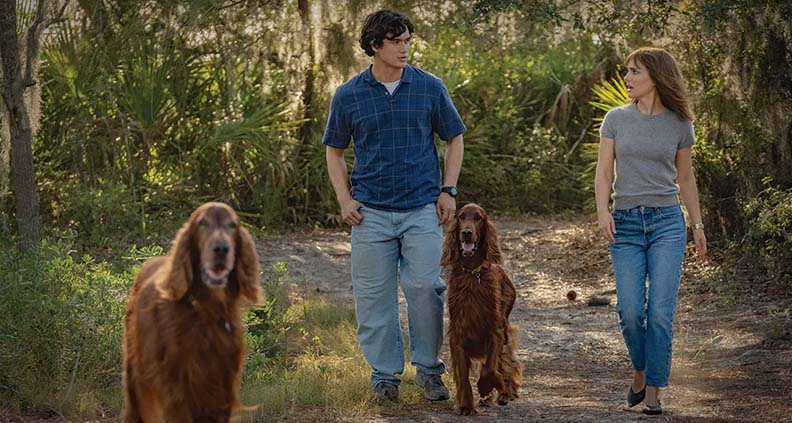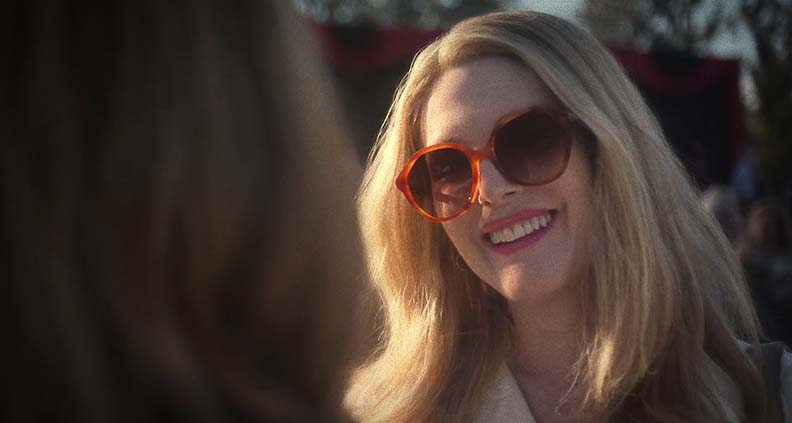Filmmaker Todd Haynes on the Mirror-Image Madness of ‘May December’
Nominated in five categories at the 39th Film Independent Spirit Awards, the darkly humorous and ominously cringey psychological drama May December is filmmaker Todd Haynes’ tenth (!) Spirit Award nomination. A pioneer of the New Queer Cinema movement, Haynes previously won Best Director for 2002’s period romantic drama Far from Heaven (starring May December co-lead Julianne Moore), as well as the Robert Altman Award for 2007’s Bob-Dylan-inspired musical fantasia, I’m Not There.
Haynes has talked about how May December is about “the stories we tell ourselves” in order to “survive our lives.” Loosely based on the 1990s-era IRL story of Mary Kay Letourneau, the film follows 59-year-old housewife Gracie (Moore), who seems happily married with children to her 36-year-old husband, Joe Yoo, played by Charles Melton. Melton, too, is nominated for Best Supporting Performance at the 2024 Spirit Awards, streaming LIVE this Sunday at 2pm PT.
The narrative tension kicks off when TV actress Elizabeth (Natalie Portman, nominated for Best Lead Performance) emerges on the couple’s doorstep, asking the family for permission to shadow Gracie for a few days in order to prepare an “accurate” portrayal of Gracie for an upcoming movie. As Elizabeth injects herself further and further into the Yoo family’s life, the fissures within the marriage begin to crack as old wounds and traumas are revived.
Always the innovator, one of Haynes’ most interesting tricks in the film is the use of Michel Legrand’s music for the 1971 period drama The Go-Between, not only as the basis of composer Marcelo Zarvo’s suspenseful original score, but also for its tone-setting use on set during filming. As a result, picture editor Affonso Gonçalves (Spirit Awards nominee for Italian drama A Chiara) already had an existing template to work with, allowing him to essentially “reverse-engineer” the pacing of each scene via the adapted score. Gonçalves previously collaborated with Haynes on the Oscar-nominated Carol and Emmy-winning series Mildred Pierce.
Such are the things you learn when you chat with Todd Haynes! And on the eve of the Spirit Awards, here’s the rest of our conversation:
TODD HAYNES

When May December was nominated in the comedy category for the Golden Globes, some were surprised by that. What is the very unique tone of this film?
Haynes: I feel like the comedy musical category [in the Golden Globes] has included films that pushed the categories a little more, to include dramatic and serious content that also take different tonal and comedic approaches. They’re not all laugh-out-loud comedies; it seems like a category that has a little bit more flexibility. A lot of people struggle to describe the tone of May December, but they talk so much about its humor. So that’s always been part of what this movie is about.
Your editor Affonso Gonçalves talks about how you don’t usually watch the dailies while shooting. Can you talk about how that works better for your process?
Haynes: I really admire that, but I can’t imagine doing what many other directors do, where they’re shooting and watching dailies and looking at cuts while they’re shooting them. I think that’s so impressive, because it gives you so much more information to apply to the shoot that you’re still in. But for myself, I need to fully fold myself into the phase I’m in and not be pulling myself out of it. I want it to stay liquid, basically. As soon as I see dailies, I seize up. It feels fixed, I cannot split off my mind from what I’m doing in real-time with my actors while we’re still on location.
Having worked with Gonçalves on six projects so far, you’ve developed a shorthand. What is your process with editing once you wrap?
Haynes: The sheer velocity and speed of production where every second is ticking away, for me, requires at least my limited ability to focus on one thing at a time. I’m checking in with Fonzie [that’s how he affectionately refers to Gonçalves], as he’s looking at stuff and making sure that he thinks we’re getting what we need. I think a lot about how I’m going to cut it later but I just can’t look ahead. I can’t look at anything that Fonzie has put together until I’ve watch the dailies alone. I go through every daily in scene order, not in shooting order, and produce hundreds of pages of handwritten notes and diagrams that I hand off to Fonzie. Then, he applies my notes to the first assembly that we’ll look at together. I gotta see it in my head first. Once I do that, I never leave the editing room, we’re there together every day until it’s done.

The monarch butterflies’ evolution sequences peppered throughout the film speaks to the theme of the story. It’s about Joe’s emotional layers and how he feels trapped in the marriage, right?
Haynes: Yeah, absolutely. It’s the metaphor. My instincts around it was to actually undermine it a little bit as a metaphor, I was concerned about being a little too precious with it, a little too poetic about it, and maybe too on the nose, as a metaphor. So, the butterflies are in the very first image in the opening credits playing against this ominous and disturbing music. And it’s pointing you towards something, an eventuality. You don’t know where it’s going to lead, but there’s a sense of warning, of danger, and something that I felt darkened that metaphor throughout that gave you a larger context, more than simply a story about somebody who gets liberated, or transforms into a creature that can fly away.
I’m glad you brought up the music. You actually used the original score from The Go-Between during filming to maintain the tone on set. How did you decide to use Michel Legrand’s score to lay the emotional foundation for May December?
Haynes: Yes, we used it on the set. I used it as soon as I started circulating my image book, which was made as a kind of nonverbal communication with my cinematographer to describe the visual language and the stylistic references and the films I’m thinking about. It had the location photographs and selections from photographers and painters that built a kind of parallel visual storyline to inform the way I visualized this movie. Around the time when I was putting that together, I saw The Go-Between on Turner Classic Movies, which I hadn’t seen since I was a kid. I was just astonished by the film, and particularly with the score. So, when I showed people the image book, I said, play this score while you turn the pages of the image book. We had a very short schedule and I wanted everybody on the same page. So, I used it while we were literally shooting the movie, and then again when we were cutting it. It got fused into how the movie was starting to work.
Some of the cinematic influences that inspired this film include Ingmar Bergman’s Persona, Autumn Sonata, and Winter Light. In several key scenes between/with Elizabeth and Gracie, they confront themselves and each other in the mirror, in direct address to the lens. How did you decide on this technique?
Haynes: They’re not breaking the fourth wall in the way that direct address is sometimes used in movies, where the character sort of steps out of the movie and speaks directly almost as an aside to the audience. In May December, it’s done with mirrors. So, the camera is the mirror and the lens is the reflection of the actor looking at themselves. And then there’s a mark off the lens, if it’s Natalie and Juliet standing together, there is a mark on either side of the lens that is their reflection of the other woman that they would see in the mirror. The first time it happens is when Natalie is in her hotel and she’s going through the tabloid images. She looks right to the lens of the camera, but then you realize it’s a mirror because she’s starting to assume a pose like Gracie and compares it to what she’s seeing in the tabloids. Towards the end of the movie, Joe comes out of the shower and he’s drying his hair. It’s the same bathroom and the same exact angle that we watched earlier, the makeup scene with the two women. And for the first time in the movie, Joe looks at himself in the mirror, meaning he looks into the lens.

Gracie is complex–sometimes, she seems like a happy housewife in suburbia America, but then, the sadness, fear and insecurity the lurks underneath quickly emerge. What aspects of Gracie do you want the audience to get the most?
Haynes: Gracie is such a complicated character. The whole genius of the script–and what I wanted to try to bring to the film–is the sense that you never feel stable about what we think about these two women; your views about them keep shifting. You begin by trusting Elizabeth and mistrusting Gracie. But that gets challenged once you observe Elizabeth’s behavior–how she treats the people around her, her mission to portray a woman [Gracie] at any cost, but she is also kind of careless with the people around her. I wouldn’t want to try to give a finite answer to who these women are, because I don’t think that’s what the film is trying to do, but that’s also what’s so thrilling about it. But having that said, there is definitely a child-like, girlish kind of fantasy, about how Gracie sees herself. It’s the way she’s been able to construe this myth around her relationship with Joe, almost as if she is some kind of a princess in a castle and he was the young knight in shining armor who was going to liberate and rescue her. It informed the way we selected her styling, her hair, the color palette, the kind of dresses that she wears, and the way she speaks. All of that help Julie [Moore] and myself try to understand how this relationship could have happened to begin with and how they justify it.
In her desperate attempt to transform herself into Gracie, Elizabeth becomes this manipulative seductress along the way, injecting herself into Joe and Gracie’s personal life. What do you think goes through her mind?
Haynes: I think her mission is to try to figure out who this woman [Gracie] is. And she’s insinuating herself into Gracie’s life, with each member of the family. And the most central figure in Gracie’s life is Joe. But I think her powers of attraction that she’s takes for granted as an actor isn’t really working on Joe, because he’s so locked up in a shell–he’s been taken out of circulation in the world and doesn’t realize his own beauty, his own voice, and his own capability. There’s the sense of uncertainty, nervousness, and anxiety as you watch the movie, and there’s also humor at times. But we definitely feel the dread about what’s happening and where it might lead.
Be sure to tune in to the 2024 Film Independent Spirit Awards this Sunday, February 25–hosted by SNL alum, Aidy Bryant–and streaming LIVE on YouTube via IMDb and Film Independent.
Film Independent promotes unique independent voices by helping filmmakers create and advance new work. Become a Member of Film Independent today. Support us with a donation here.